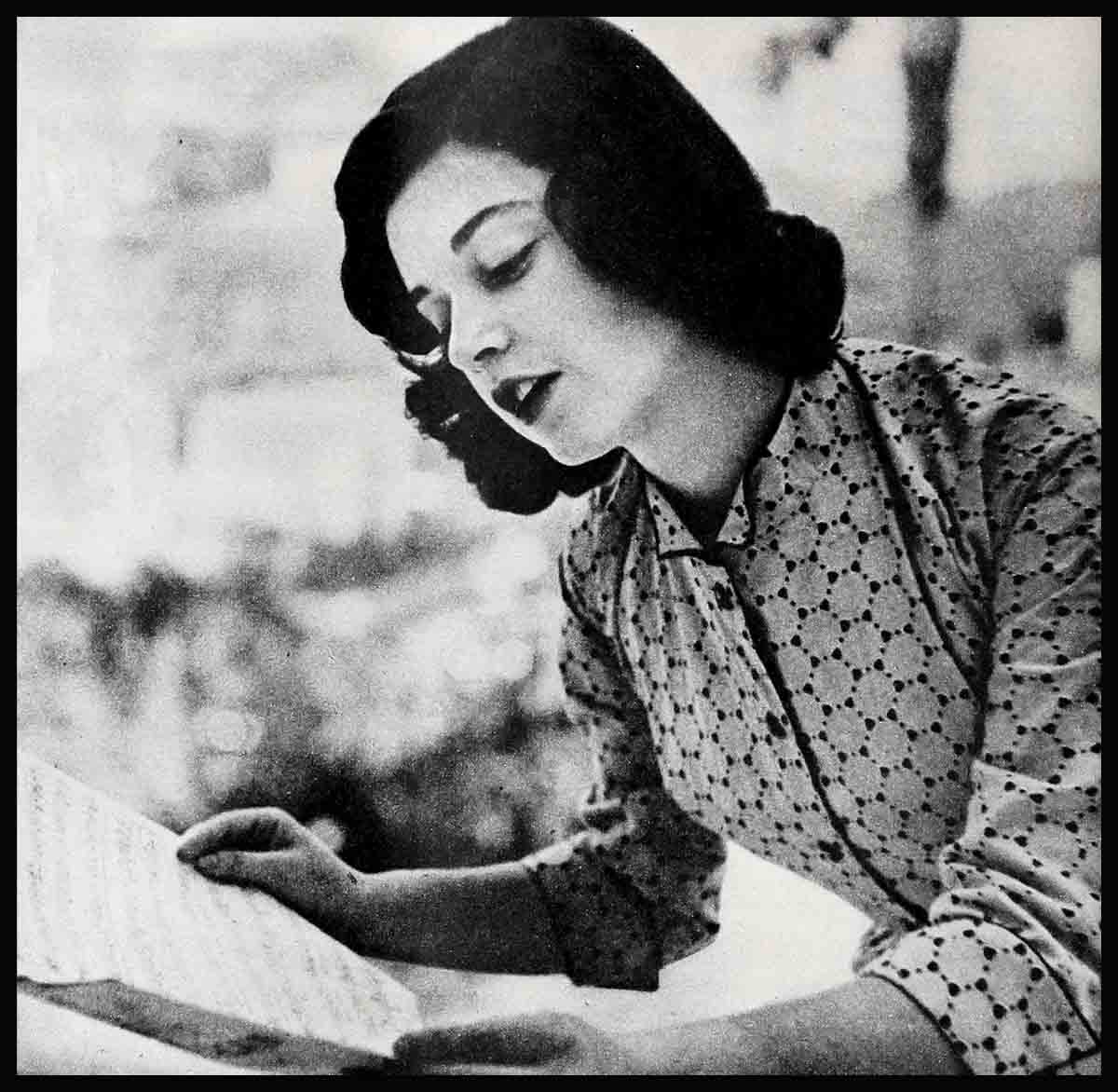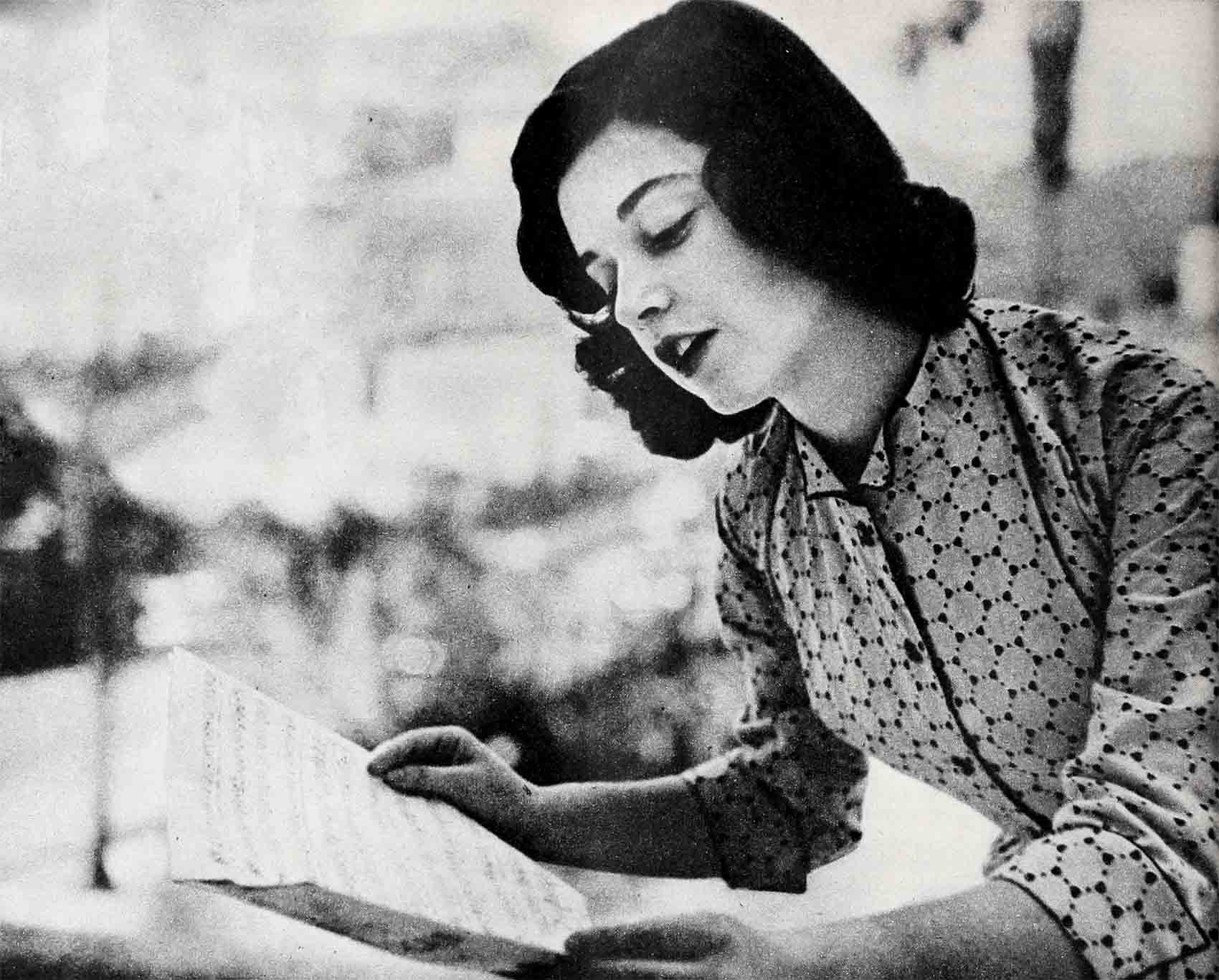
Maid In Waiting—Anna Maria Alberghetti
The young girl stood at ease under the scorching television lights, and from her throat poured the lovely, liquid notes of “Caro Nome.” Out of camera range, a handsome boy named Eddie Fisher, watched intently. Eddie was probably admiring the throat itself, warm and white and beautiful. The dark, glowing eyes. The pink cheeks.
When the applause had died at last and the hot lights were dimmed, he thanked Anna Maria Alberghetti for appearing on his show. He told her she was terrific. Then he asked, “Look, couldn’t we go out, sort of celebrate?”
The pink deepened charmingly in her cheeks. “I would love to go, Eddie,” Anna Maria said. “Perhaps another time. Tonight I . . . am a little tired. The plane trip here to New York from the Coast, the rehearsals and everything. I hope you understand.”
Anna Maria was still keyed up from her performance, still excited, and it would have been wonderful if the remaining hours of the evening had been spun out of the same glorious excitement. Instead, she quietly returned to her hotel, to dream of what they might have done.
Another plane brought her swiftly back to Hollywood, back to the family with which she shares everything. Everything except the dreams. “I wanted very, very much to go out with Eddie,” she confessed to a confidante. “But . . . I knew my father wouldn’t like it. Still, I do not like to say that I am not yet permitted to go on dates, that I have never had one. So, when I am asked, I make a little excuse.”
Somewhere in the future lies that all-important first date. Never suppose she hasn’t thought.of it often; she would like it to be a dancing date, complete with soft lights, romantic music and Anna Maria in a long, white dress. But the boy is still a misty figure. “Just a plain, quiet boy—it takes intelligence to be quiet.” And if the plain quiet boy were to appear tomorrow, would her parents permit her to go out with him?
“They wouldn’t like it, I know,” Anna Maria says without hesitation, “But there will be no forbidding. It has never come up yet because it hasn’t been important to me.”
Hers is not a forbidding family. There have been rumors that her parents would not permit her the use of make-up, high heels or more mature clothes. “Ridiculous,” says Anna Maria. “I have worn stage make-up since I was six years old, but when I am not working, I like to keep my face clean so the skin can breathe. I like only a little lipstick, and pale, so that it still looks natural. I would look very foolish in sophisticated clothes at my age.” And she will continue to think so—until she falls in love.
She dreams of love, the girl-child Anna Maria, but vaguely. To fall in love is the proper thing to do and when the proper time comes, she will do so. Conveniently, of course, so that she can be married at what she considers the proper age—twenty-three.

Her dream of love is that of a girl who has never been smitten with that giddy, wonderful sensation called a crush. She has never gone weak in the knees at the sound of a special voice. Nor felt the brush of angels’ wings at a touching of hands.
All of these things will happen to Anna Maria—and sooner than she expects. No one so lovely and Latin and emotional can stand still on the thresh-old of life for long.
She will have more and more excuses to make to avoid dates in the future, because she’ll be asked out with increasing frequency. Anna Maria is growing into a beautiful woman. And she has enormous sex appeal.
It blends oddly with her childlike qualities. the wonder at a new world and its way of doing things. There was, for instance, her sixteenth birthday.
When she opened her eyes that morning, Anna Maria felt that special glow. It was her day. Her heart danced as she went in to breakfast and, smilingly, the family understood. And then she went to the studio.
There it was just another working day. Everyone smiled and said hello in a perfectly ordinary way.
Nobody knew. Tomorrow she would casually mention it, she thought as she made her way back to the set after lunch, and everyone would feel a little remorseful because they hadn’t known. She tugged at the heavy double-doors that seal off a set while a scene is being shot; she went in—and her heart stopped. “Happy birthday to you.” sang the grinning cast and crew of “The Stars Are Singing.” “Happy birthday. Anna Maria, happy birthday to you!” There was the cake with its sixteen candles burning, there were all her studio friends and the mountain of gifts they had hidden from her during the morning’s shooting schedule.
Her friends weren’t content to leave it as a surprise party, though; they felt an additional American touch was needed. One by one they warned her about Tommy Morton. He was full of tricks, they said, and his gaily wrapped gift was sure to be nothing but a gag. Something would pop out of the box to frighten her.
“So, I wouldn’t open it,” she admits.
Tommy was there, of course, alert and impatient. Now and again he’d say, “Why don’t you open mine next, Anna Maria?” and each time she’d pretend not to hear.
“Then there was nothing else left,” she says. “So I had to open it. What a surprise! It wasn’t any trick, but a beautiful little gold wrist watch.”
Her parents, Daniele and Vittoria, were proud that her co-workers on the Paramount lot liked their daughter well enough to give her a party. It had been a perfect birthday. But was it? As the evening wore on, something was missing—a friend her own age who would truly understand.
This is the one flaw in what Anna Maria considers a practically perfect life. As American girls of her age have long since been dating, she would have little in common with them even if she had a chance to meet them, which she hasn’t.
Anna Maria is five feet, four inches tall and weighs a pleasingly distributed 110 pounds except when she is making a picture. “The studio makes me take off ten pounds—and oh, how hungry I am then!”
On the subject of food she is eloquent. “I do not like spaghetti. I say so, but everyone says that I am crazy about spaghetti because I am from Italy. Ravioli, yes. And lasagne—ummmm! Of American food I am fondest of beefsteak. But I want to make this clear: I don’t like spaghetti.”
She loves singing to an American audience. “They’re different, not cynical. You can tell that they want and expect to like you from the beginning. In other countries sometimes you have got to work to warm your audience up. Here I can just concentrate on singing.”
Anna Maria has concentrated on singing since the age of six. When Papa Daniele used to call her for her lesson, she would immediately drop her doll and run to him. His word is still law with her. But she is growing up, and there is a suggestion of steel beneath the softness.
Her little brother, Paul, is more than a prodigy; he is a musical genius who has led full symphony orchestras since he was four years old. Two years ago, when Anna Maria was fifteen and Paul six, the family went home to Pesaro. There it was suggested that a brilliant tour de force would be a joint concert by the two. Signor Alberghetti agreed, and the 3,000-seat opera house was sold out immediately.
She was in excellent voice that night. Then little Paul, a small, sober figure in knee britches, stepped to the podium and raised his baton to lead 120 musicians through an intricate symphony.
“It was hopeless,” recalls the female of the species. “I sang my heart out for them, and do you know what they said afterward? They said, ‘Well, yes, Anna Maria—but that darling little boy!’ And I said, ‘Never again!’ Paul gives his concerts, and I give mine!”
She is just as positive on the subject of love and marriage. She strongly approves of the long engagements customary in Italy because, she says, “You must be very, very sure. After all, marriage is for the rest of your life.”
She is quite sure that she will marry a non-professional. “Actors and singers must be high-strung temperamentally,” “Their work depends on it. If we were being nervous at each other, it would be a bad marriage.”
But she will wait patiently for marriage—and for love. She will not try to rush life. “Oh, my, no!” she says. “I hope it doesn’t happen to me for many years. If love is all these things I hear,”
she adds gravely, “it must be very distracting—and wonderful . . . Is it?”
THE END
—BY EVE FORD
It is a quote. PHOTOPLAY MAGAZINE SEPTEMBER 1953




